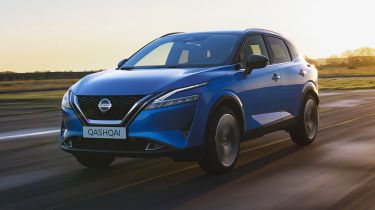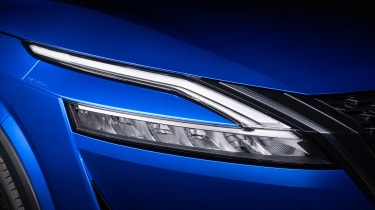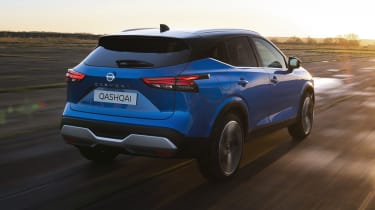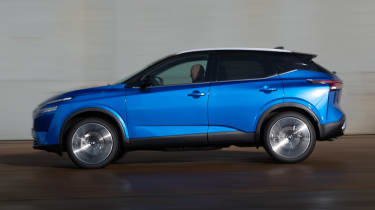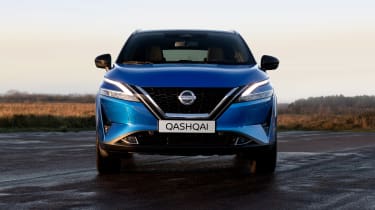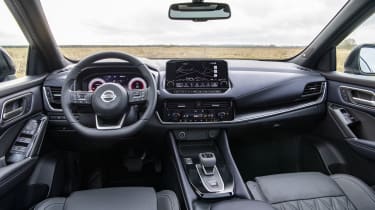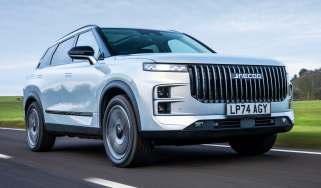New Nissan Qashqai: e-Power hybrid engine detailed and prototype review
Nissan Qashqai SUV gains a new hybrid engine later in 2022, and we’ve driven it
- Familiar Qashqai styling is modernised
- Five trim levels available starting from £24,555
- A choice of e-Power hybrid and mild-hybrid engines
The Nissan Qashqai is getting a new hybrid engine later this year. It’ll be dubbed the e-Power hybrid, and will sit above the Qashqai’s current mild-hybrid petrol models. Claiming to provide the driving experience of a fully electric car without the range anxiety, it’s an important addition to the popular Qashqai line-up. We’ve already tried it out, and you can read our impressions further down the page.
Prices aren’t finalised for the e-Power models yet, but the Qashqai range starts from £24,555 at the moment. Trim levels rise through Visia, Acenta Premium, N-Connecta, Tekna and Tekna+.
While clearly related to previous generations, the new car gets a bold new face that’s dominated by C-shaped LED headlight clusters. The Qashqai has grown slightly, improving space inside, and the tech onboard has been upgraded. It renews its rivalry with other family SUVs such as the Ford Kuga, SEAT Ateca and Peugeot 3008.
2022 Nissan Qashqai e-Power hybrid
The e-Power hybrid system features a 1.5-litre three-cylinder petrol engine that makes 154bhp, plus an electric motor that’s similar in size to the one in the Nissan Leaf EV. The total power output is 187bhp. Most hybrids use the electrified powertrain to assist the petrol engine and make it more economical, but the Qashqai e-Power operates differently - using the petrol engine as a generator to power the electric motor.
As the wheels are driven directly by the electric motor rather than the petrol engine, Nissan promises that it’ll feel more like an electric car than a regular petrol one, but without the need to plug in to recharge. Expect instant response and quick-feeling acceleration, as well as a quiet powertrain. Energy is fed back into the battery under braking.
Nissan says that Qashqai customers typically spend nearly three-quarters of their time in urban areas, so we’d expect the e-Power engine to offer an electric-only driving mode for short periods of time. It also features Nissan’s e-Pedal braking system, which slows the car down as soon as you step off the accelerator. Like the Juke hybrid, it’ll bring the car to walking speed rather than bringing you to a complete stop like the Leaf does.
We’re told the Qashqai e-Power ‘accelerates quicker than hybrid rivals’, but plug-in hybrid SUVs will be more efficient. Initial figures suggest it’ll return 53mpg and CO2 emissions of 119g/km.
Trim levels and prices
The 2021 Nissan Qashqai range kicks off with the Visia trim level, which starts from £24,555. Power comes from a 138bhp turbocharged 1.3-litre petrol engine with mild-hybrid electrical assistance and a manual gearbox.
Opting for the Acenta trim costs from £27,155 with the same engine and gearbox. A more potent 156bhp version of the same engine is also available, starting from £27,875 for the manual, and £29,475 for the automatic.
Above this, the N-Connecta and Tekna trims can be specified with every version of the 1.3-litre petrol engine, with either an automatic or a manual gearbox. These trims are also available with four-wheel drive but this can only be chosen with the more powerful 156bhp engine and an automatic gearbox. N-Connecta is priced from £29,190, rising to £31,865 for the Tekna model.
The flagship Tekna+ is also offered. It’s priced from £35,195 and is only available with the 156bhp engine. In front-wheel-drive form, buyers can pick from a manual or automatic gearbox, with the four-wheel drive model only available with the automatic.
Styling
The new model gets a similar V-shaped grille to the previous car, but the new headlights and other styling changes will give it an eye-catching design. It looks more like the electric Nissan Ariya than the smaller Nissan Juke. There are new alloy wheel designs, up to 20 inches in size for the first time, and an extended paint palette. You can choose 11 colours and add a contrasting roof colour with five of them.
The rear end looks similar in shape to the current model but there are reshaped brake light clusters, a flatter tailgate and a new rear bumper. Picking the largest 20-inch wheels means you also get upgraded multi-link rear suspension.
Engines
The 1.3-litre petrol engine is carried over from the last-generation Qashqai but gains mild-hybrid technology, which should slightly lower fuel consumption and emissions. A small battery stores energy usually lost during braking and uses it to assist the petrol engine when accelerating (between 12 and 68mph).
The petrol engine is available with either 138bhp or 156bhp. Both get a six-speed manual gearbox but you can opt for a CVT automatic gearbox and four-wheel drive on the latter. We’re told that both gearboxes have been improved, while updates have also been made to reduce friction and improve turbo response.
Interior
The new Qashqai will come with a thoroughly overhauled cabin. A large, glossy touchscreen now sits at the top of the dashboard, instead of in the middle of the centre console. Rather than a clutter of shortcut buttons around the edges, the new nine-inch infotainment system relies on tiles on the screen - although some useful physical buttons remain underneath.
It introduces wireless Apple CarPlay alongside the existing Android Auto software, offers wifi for up to seven devices and comes with a range of online features - including live traffic updates - although these may only be available on higher-spec versions.
The climate control panel has been redesigned but we’re pleased to see that it remains a very analogue system with physical buttons. One aspect that has become digital is the 12.3-inch instrument cluster, which boasts relevant driving information as well as sat-nav guidance. Other high-spec kit available includes a Bose sound system, massaging front seats, a large wireless phone charging pad and a 10.8-inch head-up display, which Nissan says is the biggest fitted to any medium-size SUV.
Practicality
The new Qashqai is 35mm longer and 30mm wider than the last Qashqai, so it’s perhaps unsurprising that practicality has improved. Rear-seat passengers get 22mm more knee room, while both rows benefit from around 15mm extra headroom. Nissan has relocated the cupholders so you’re less likely to knock drinks over when changing gear, and it has kept the last model’s reversible boot floor. Luggage capacity has grown by 74 litres, so its 504-litre space is now competitive with some of the bigger SUVs in the class.
2022 Nissan Qashqai e-Power prototype review, by John McIlroy
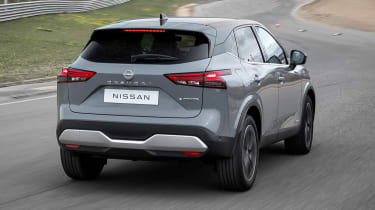
Nissan Europe boss Guillaume Cartier told us “We do things differently”, and that’s certainly the case for the Qashqai e-Power. It’s powered only by its electric motors when you drive, but there’s no plug to charge it up. Instead there’s a petrol engine that’s only job is to act as a generator to charge the battery pack. It’s a technology that’s already made waves in Japan, where the Nissan Note fitted with a similar set-up is a top-seller.
Our initial drive was restricted to a test track, but it gave us a good idea of how e-Power will act in the wider world. It certainly does feel a lot like driving an EV, especially at urban speeds, with the only difference being the faint hum of the three-cylinder engine in the background.
Accelerate harder and the motor also revs more keenly to pump more electricity back into the battery – it’s a similar sensation to driving a car with a CVT automatic gearbox, as the engine noise doesn’t directly relate to the acceleration you’ll experience.
It’s only temporary, and passengers distracted by the stereo may not even notice it. While driving around town, there are times when the battery has enough charge for the engine to shut down and the motors work in complete silence, just like a hybrid. Nissan has also included e-Pedal, which allows the car to slow down when you take your foot off the accelerator with minimal use of the brake pedal – although it won’t bring the car to a complete stop.
Want to know more about the current Nissan Qashqai? Check out our review, or see how it compares to the best SUVs you can buy right now.
Recommended

New Subaru Trailseeker revealed as rugged electric SUV with 375bhp

New Subaru Solterra brings more range, power and polish
Most Popular

Omoda E5 targets rivals: now with zero deposit and APR
Tips & advice

Car dashboard warning lights: what does each symbol mean?

Electric car charging stations: public networks, charger types, apps and maps


